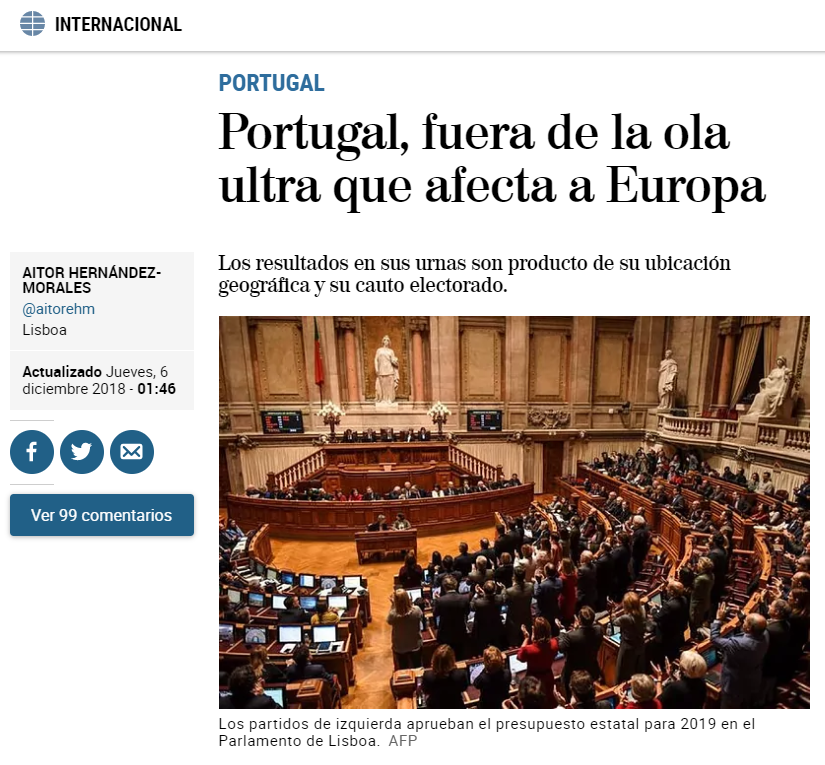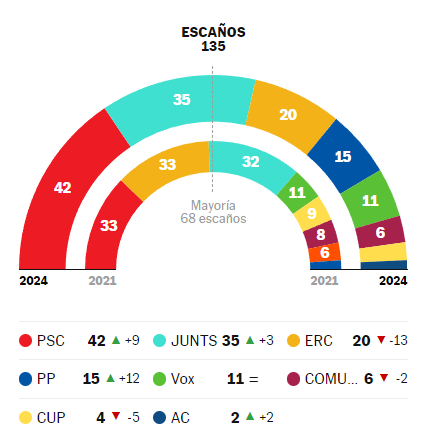Back in 2018, when I was working as a foreign correspondent in Lisbon, I got a call from my editor back in Madrid asking me to put together a story about one particular example of Portuguese exceptionalism: the abscence of the far-right within its political landscape. 

Just a few days prior, VOX, a new ultranationalist party, had won 12 seats in the Andalusian regional elections, marking the first time that a far-right group had made it into a regional parliament in Spain since the country's return to democracy. 

Across Europe, center-left parties were on the decline while right-wing populist parties were making major gains.
But then there was trusty Portugal...

But then there was trusty Portugal...


Somehow, the country nestled in Europe's southwestern corner seemed to be bucking the trend. Forty years after the triumph of the Carnation Revolution, its people appeared to remain true to the values that had put an end to Salazarism and recovered democratic ideals. 

Some said this exceptionalism was due to the country's constitution, which includes an article which prohibits "armed associations, military, militarized or paramilitary-type associations and organizations that are
racist or display a fascist ideology."

racist or display a fascist ideology."


Others said that the country's geographic remoteness and relative poverty was responsible: the 2015 migrant crisis hadn't affected Portugal and the refugees relocated there by the EU had left in search of better futures in the north. The far-right had no one to rail against. 



And still others said that the secret that explained Portugal's situation was its electorate, in which pensioners and civil servants — cautious folk worried about financial stability and unlikely to be swayed by populist rhetoric — have outsized weight. 

Many said that those factors, plus the advantage of having people who remembered the horrors of fascism due to the dictatorship's relatively recent end, were a sort of a vaccine that would prevent Portugal from following the example set by the rest of Europe. 

But academics I spoke to said that no country was truly immune from the phenomenon, and stressed that Portugal's exceptionalism could easily conclude if the economic recovery it was then enjoying — largely due to its booming tourism industry — came to an end. 

They pointed out that the Portuguese political class hadn't managed to address citizen's most pressing concerns — low wages, lack of industry and problematic long-term prospects for the youth — and said that the situation left an opening for a charismatic rival on the far-right. 

And they added that so far the far-right had been kept at bay because its few candidates had been such jokes. At the time its standard bearer was André Ventura, a TV football commentator turned populist demagogue who railed against Portugal's small roma community. 

Although Ventura was a clownish figure, the academics warned that he was seizing on racist attitudes that were embedded in parts of Portuguese society and pointed out that there were parts of the country where frog figurines were still displayed in shops to "ward off gypsies." 



They also highlighted that, with such a small number of active voters — only five million in the last national elections — a skilled politician would have an easy time of swaying Portugal in one direction or another. 

Well, less than a year after my article came out, Portuguese exceptionalism came to an end when, by the narrowest of margins, Ventura won a single seat in Parliament in the October 2019 legislative elections. 

You would think that a single seat wasn't that big a deal — and, to be sure, in terms of legislative work, Ventura hasn't done anything with it during the past year — but it did give the far-right politician the air of legitimacy from which to build up his image. 

And in a year in which the Portuguese economy went under as COVID shut down tourism, Ventura has used his platform to rail against the system and build up buzz around his candidacy for the Presidency of the Portuguese Republic. 

While there was never any possibility that he would defeat the incumbent — former—conservative-turned-independent Marcelo Rebelo de Sousa — there were doubts as to whether Ventura might actually come in at second place, beating out former Socialist MEP Ana Gomes. 

In then end, Marcelo has won and Gomes has come second but, head's up, Ventura has ended up in a not-particularly-distant third place, with 496,583 votes, only 44,762 behind the Socialist candidate.
In a country of five million active voters those results are significant.
In a country of five million active voters those results are significant.

In keeping with a promise to resign from his party's leadership if he got less votes than Gomes, after the results came out late last night Ventura stepped down from his post as leader of 'Chega' ("Enough" in Portuguese). But does that really mean anything? Probably not. 

Ventura remains the face of Portugal's far-right and he can now boast that, in these elections, voters gave him more votes than those garnered by the candidates for the leftist Bloco de Esquerda or the Communist Party, both key allies of Socialist PM Costa's minority government. 

He's out to make the most of that popularity, and last night he concluded his speech predicting that he would become a kingmaker in Portugal, with no future government being able to come to power without his party. Hell of a boast, but let's see what happens.
Happy Monday, all.
Happy Monday, all.

Addenda to this thread:
As @sofiadmateus points out, Ventura very much used the Bannon / Trump playbook of using insults and talking over people in debates to get ahead. It didn't matter what he said, the key was just to appear to never be retreating.
As @sofiadmateus points out, Ventura very much used the Bannon / Trump playbook of using insults and talking over people in debates to get ahead. It didn't matter what he said, the key was just to appear to never be retreating.

During this campaign he also appeared to benefit from an episode mirroring the experience of his far-right model in Brazil, Jair Bolsonaro, whose numbers soared after he was mysteriously stabbed during the 2018 presidential elections. 



While making an appearance in Setúbal protestors pelted Ventura with objects. The far-right candidate suggested that he had been stoned and presented himself as a martyr to his cause... But journalists later established that he had actually been hit by a small box of gum. 

In addition to copying the Bannon / Trump playbook in terms of diatribe, Ventura also similarly benefitted by media complicity in his rise. Portuguese TV personalities were totally fine with brining him onto their shows (and whitewashing him) in order to boost their ratings. 



They ok with this even as Ventura was openly declaring that:
— Roma people should be put in camps
— Portugal needed a new dictatorship
— If elected, a specific gender-bending celebrity would no longer be welcome in Portugal
— The elections might be rigged



— Roma people should be put in camps
— Portugal needed a new dictatorship
— If elected, a specific gender-bending celebrity would no longer be welcome in Portugal
— The elections might be rigged




A lot of soul-searching needs to happen in Portugal if the country wants to reverse the far-right's expansion.
Citizens who abstained yesterday, but are outraged this morning, need to make sure to vote next time around.
The media needs to take a hard look at its role.
Citizens who abstained yesterday, but are outraged this morning, need to make sure to vote next time around.
The media needs to take a hard look at its role.

And if hard-won democracy is to be preserved, conventional political parties need to revise their strategies and respond to the real needs of the Portuguese people. Without that it will always be easy for someone to come in with scapegoats and easy solutions to seduce voters.
🇵🇹
🇵🇹

• • •
Missing some Tweet in this thread? You can try to
force a refresh





















